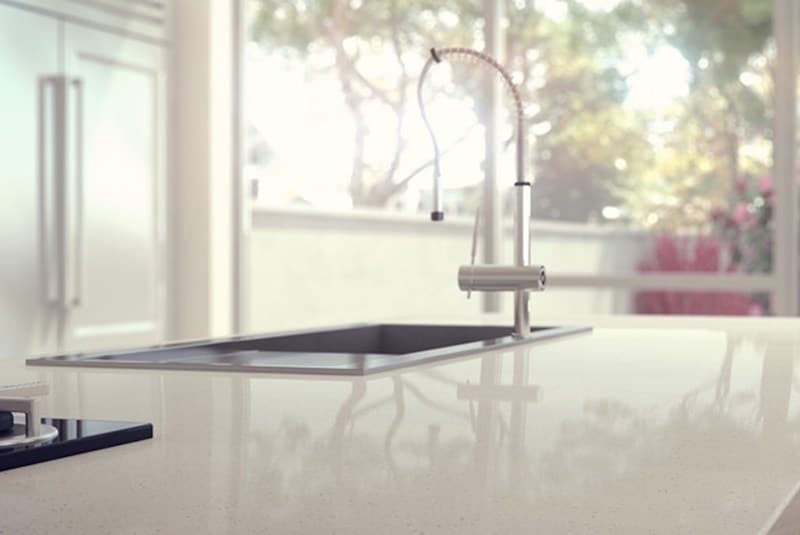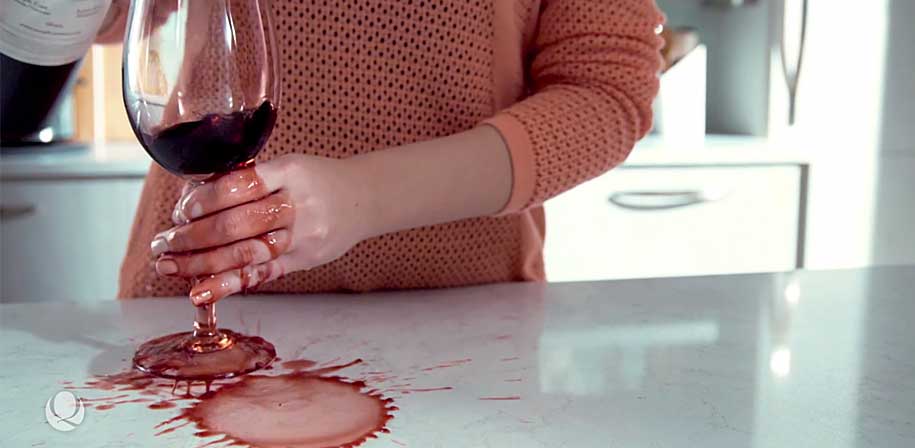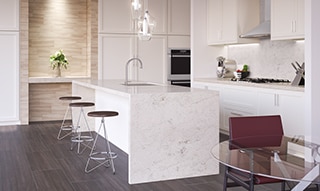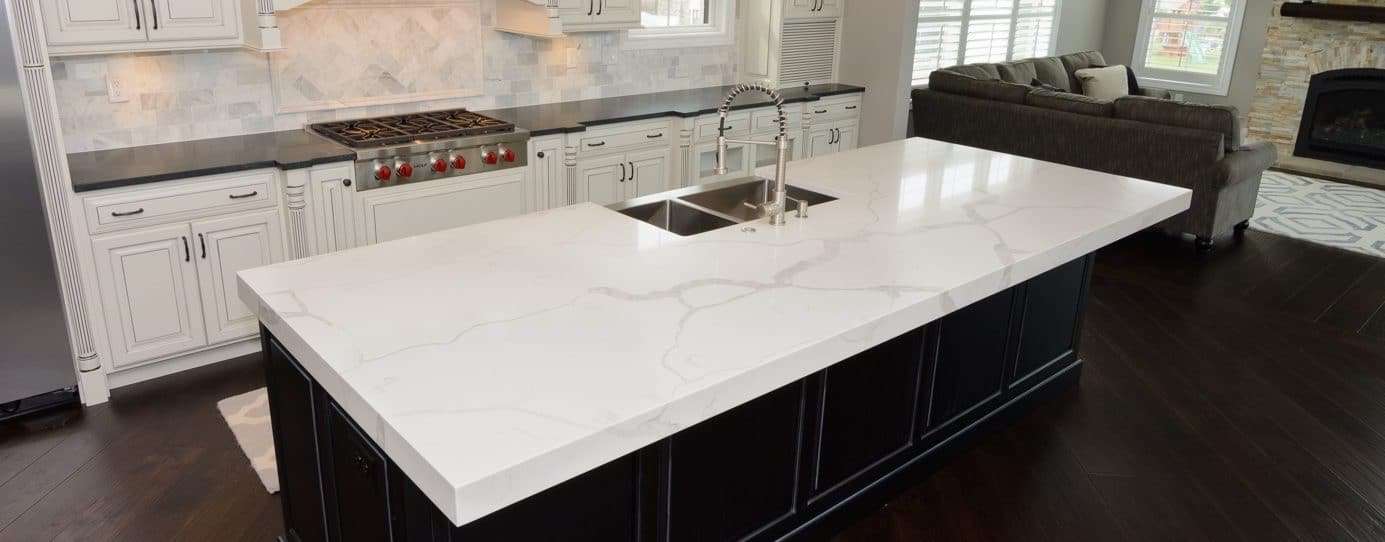Quartz countertops are renowned for their durability, low maintenance, and aesthetic appeal, making them a popular choice for kitchens and bathrooms. Proper maintenance and care are essential to preserve the beauty and longevity of quartz countertops. Here’s a comprehensive guide to quartz countertop maintenance and care:
Daily Cleaning Routine: Establish a daily cleaning routine to remove dirt, spills, and debris from the surface of your quartz countertops. Use a soft cloth or sponge and mild soap or pH-balanced cleaner to wipe down the countertops, followed by a thorough rinse with water to remove any residue.
Avoid Harsh Chemicals: Avoid using harsh or abrasive cleaners that can damage the surface of the quartz countertops. Acidic or alkaline cleaners, such as those containing vinegar, bleach, ammonia, or citrus oils, can etch or discolor the quartz surface over time. Stick to gentle, non-abrasive cleaners specifically formulated for quartz surfaces.
Use Gentle Cleaning Tools: Choose cleaning tools that are gentle on the quartz surface to prevent scratching or dulling. Soft cloths, non-abrasive sponges, or microfiber towels are ideal for wiping down quartz countertops without causing damage.
Remove Stains Promptly: Promptly clean up spills and stains to prevent them from penetrating the porous surface of the quartz countertops. For stubborn stains, use a gentle cleaner and a soft-bristled brush to gently scrub the affected area, followed by rinsing with water and drying with a clean cloth.

Avoid Heat Exposure: Protect quartz countertops from direct heat exposure to prevent damage or discoloration. Use trivets, hot pads, or heat-resistant mats to place hot cookware or appliances on the countertop surface, and avoid placing hot pans or dishes directly onto the quartz surface.
Prevent Scratching: Avoid cutting or chopping directly on the quartz countertop surface, as sharp objects can scratch or damage the surface. Always use cutting boards or protective mats when preparing food to prevent scratches and maintain the integrity of the quartz surface.
Sealant Maintenance: Unlike natural stone countertops, quartz countertops do not require sealing to maintain their integrity. However, periodic resealing of seams may be necessary to prevent moisture penetration and ensure a watertight seal. Consult with your countertop manufacturer or installer for specific recommendations on sealing maintenance.

Avoid Excessive Pressure: Avoid applying excessive pressure or force to quartz countertops, as this can cause cracking or chipping along the edges or corners. Take care when moving heavy objects or appliances on or near the countertop surface to prevent damage.
Prevent Hard Water Stains: Hard water can leave mineral deposits or stains on quartz countertops if allowed to dry on the surface. Wipe down the countertops regularly with a damp cloth to remove any hard water residue, and dry the surface thoroughly to prevent water spots or stains.
Routine Inspections: Periodically inspect the quartz countertops for any signs of damage, wear, or discoloration. Address any issues promptly to prevent further damage and preserve the beauty and integrity of the countertop surface.
Avoiding Impact Damage: Take precautions to prevent impact damage to quartz countertops, as they can chip or crack if struck with enough force. Avoid dropping heavy objects onto the countertop surface and use caution when handling sharp or heavy items near the edges or corners.
Proper Installation: Ensure that quartz countertops are installed properly by experienced professionals to minimize the risk of damage or issues with the countertop surface. Properly installed countertops will provide a secure and stable foundation for years of use.

Regular Maintenance Schedule: Establish a regular maintenance schedule to keep quartz countertops looking their best. Schedule periodic deep cleanings and inspections to remove any buildup, stains, or debris and address any maintenance issues promptly.
Avoiding Abrasive Cleaning Tools: Refrain from using abrasive cleaning tools or harsh scrubbing pads on quartz countertops, as they can scratch or dull the surface. Stick to gentle cleaning tools and techniques to preserve the shine and finish of the quartz surface.
Educating Household Members: Educate household members on proper quartz countertop care and maintenance to ensure that everyone understands how to protect and preserve the beauty of the countertops. Encourage family members to follow the recommended cleaning and care guidelines to prolong the lifespan of the quartz surface.
![]()
Common Mistakes to Avoid:
Using Harsh Cleaners: Avoid using harsh or abrasive cleaners on quartz countertops, as they can damage the surface and dull the finish. Stick to gentle, non-abrasive cleaners specifically formulated for quartz surfaces to maintain the integrity and shine of the countertops.
Neglecting Stain Removal: Neglecting to remove stains promptly can result in permanent discoloration or damage to quartz countertops. Clean up spills and stains as soon as possible using gentle cleaners and techniques to prevent them from penetrating the surface.
Skipping Routine Maintenance: Skipping routine maintenance and care can lead to buildup, staining, or damage to quartz countertops over time. Establish a regular maintenance schedule and follow recommended cleaning and care guidelines to keep your countertops looking their best.
Using Improper Cleaning Tools: Using abrasive cleaning tools or harsh scrubbing pads can scratch or damage the surface of quartz countertops. Stick to soft cloths, non-abrasive sponges, or microfiber towels for gentle cleaning and maintenance.
Ignoring Manufacturer Recommendations: Ignoring manufacturer recommendations for quartz countertop care and maintenance can result in damage or void warranties. Follow the manufacturer’s guidelines for cleaning, care, and maintenance to ensure the longevity and performance of your quartz countertops.

Can quartz countertops be repaired if damaged?
While quartz countertops are durable, they can be repaired if chipped, cracked, or damaged. Contact a professional stone fabricator or repair specialist to assess the damage and determine the best course of action for repair.
Do quartz countertops require sealing?
No, quartz countertops do not require sealing like natural stone countertops. However, periodic resealing of seams may be necessary to prevent moisture penetration and ensure a watertight seal.
Are quartz countertops heat resistant?
Quartz countertops are heat resistant to a certain extent, but they can be damaged by prolonged exposure to high heat. Use trivets, hot pads, or heat-resistant mats to protect the surface from direct contact with hot cookware or appliances.
How do I remove stains from quartz countertops?
To remove stains from quartz countertops, use a gentle cleaner and a soft-bristled brush to gently scrub the affected area, followed by rinsing with water and drying with a clean cloth. Avoid using harsh or abrasive cleaners that can damage the surface.
Can quartz countertops be refinished or polished?
Yes, quartz countertops can be refinished or polished to restore their shine and appearance. Contact a professional stone fabricator or restoration specialist to assess the condition of your countertops and determine the best course of action for refinishing or polishing.

How to Clean Quartz Countertops

ONE Quartz Care u0026 Maintenance Step-by-Step Guide Daltile

How to Clean Quartz Countertops Molly Maid

What Is the Best Quartz Cleaner for Countertops? – Granite Gold®

Related articles:
- White Engineered Quartz Countertops
- Artificial Quartz Countertops
- Quartz Countertops With Brown Cabinets
- Cheap Quartz Countertops
- Eased Edge Quartz Countertop
- Sage Green Quartz Countertops
- Engineered Quartz Countertops
- Quartz Countertops Styles
- Quartz Countertops Caesarstone
- Kitchen Quartz Countertop Ideas